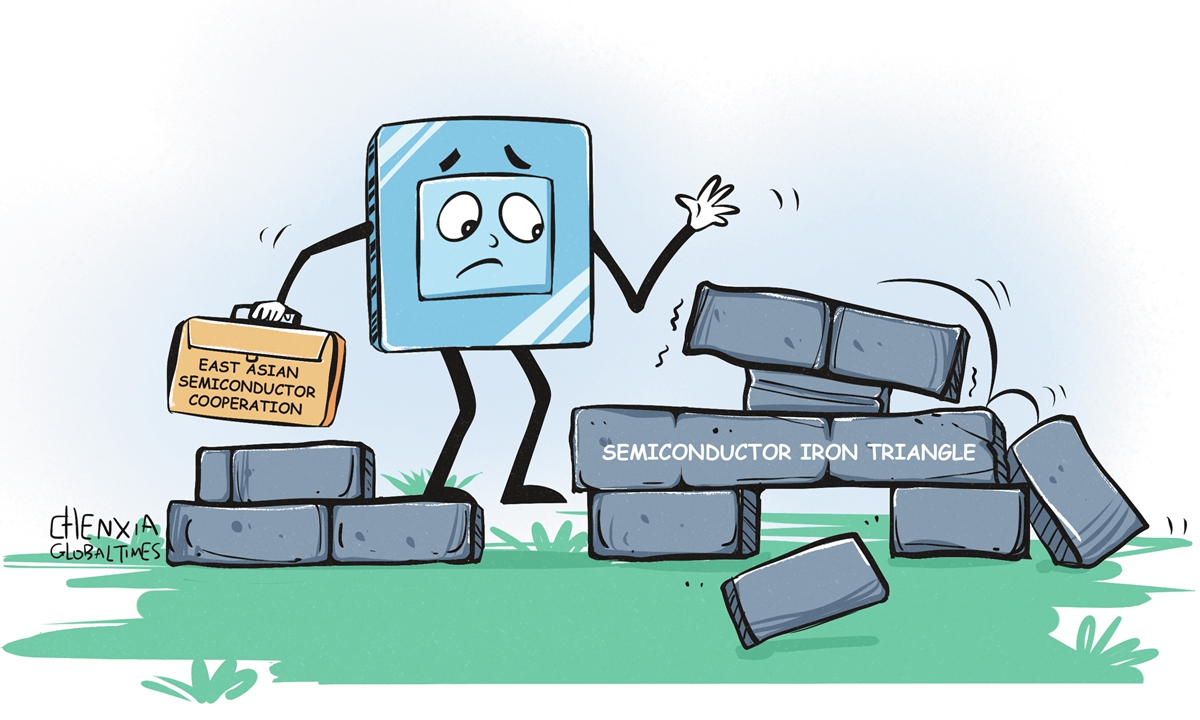
Illustration: Chen Xia/GT
Recently, former Japanese minister of economy, trade and industry Yasutoshi Nishimura publicly advocated for the so-called "semiconductor iron triangle," promoting trilateral cooperation among the US, Japan, and Taiwan island. He suggested leveraging the concept of semiconductor security to persuade US government, citing a shared "enemy" as the justification.
The so-called "semiconductor iron triangle" is, at its core, a containment mechanism aimed at China - designed to please the US in exchange for strategic protection. Even as the tariff stick is already pounding on Japan's doorstep, some Japanese politicians still assume a submissive posture, signaling, "I'm willing to be your enforcer - just spare me."
This is their habitual "pledge of allegiance" - an outdated tactic and a worn-out calculation, yet they tirelessly clatter away with it, as if the noise alone could change anything.
What's truly alarming is the mindset behind it.
Since the Cold War, Japan's security dependency on the US has increased, with many policymakers viewing "pleasing the US" as a prerequisite for development. The so-called "semiconductor iron triangle" boils down to one thing: Japan is making a plea to be kept in the game by the US, with technology becoming a bargaining chip and sovereignty the price. Some Japanese politicians firmly believe that to earn Washington's trust, they must demonstrate loyalty in the campaign to contain China.
But does this "ironclad pledge of allegiance" win any real appreciation?
TSMC's experience has already provided the answer. Its multi-billion-dollar investment in the US was once hailed as a sign of closer ties. However, what followed was the threat of a 100 percent tariff to push for even more investment.
"This 'iron triangle' is nothing more than political flattery toward the US," Lü Chao, an expert at the Liaoning Academy of Social Sciences, told the Global Times. It hinges on whether one remains useful to Washington - hardly an 'iron' bond at all. "This is a failed policy," Lü added. "The persistence of some politicians in pushing this narrative reveals that their motivations are far from economically rational. It's a naked act of political opportunism."
Compared with the political opportunism of some Japanese politicians, domestic opposition to blindly following the US is growing stronger in response to Washington's "reciprocal tariffs." According to the latest poll by Kyodo News, 84.2 percent of respondents in Japan believe that the Trump administration's tariff policies will affect their daily lives, reflecting rising concerns among the Japanese society.
This mounting anxiety also reflects a profound discontent over blindly following the US. Such behavior not only exhausts public patience, but also sows the seeds of long-term stagnation.
Japanese Prime Minister Shigeru Ishiba has warned that US tariffs could "disrupt the world's economic order" and emphasized that Japan "cannot make continuous compromises" in its trade talks.
The Trilateral Economic and Trade Ministers' Meeting between China, Japan and South Korea has been progressing smoothly. Under these circumstances, East Asian economic and trade relations have shown signs of a rebound, indicating a positive trajectory for future development.
East Asia holds the potential to establish a new model of complementary growth in the semiconductor sector. A cooperative framework could foster synergy and mutual benefit. But the logic behind the "semiconductor iron triangle" threatens to derail this vision, turning the prospect of shared prosperity into the risk of future conflict.
History shows that no tech blockade has ever successfully contained innovation. On the contrary, it often accelerates self-sufficiency and breakthroughs. The "semiconductor iron triangle," in the long run, leads only to fragmentation and failure. What wins the future is not walls, but bridges. Using the "semiconductor iron triangle" as a pledge of allegiance may make some noise - it won't win the game.




